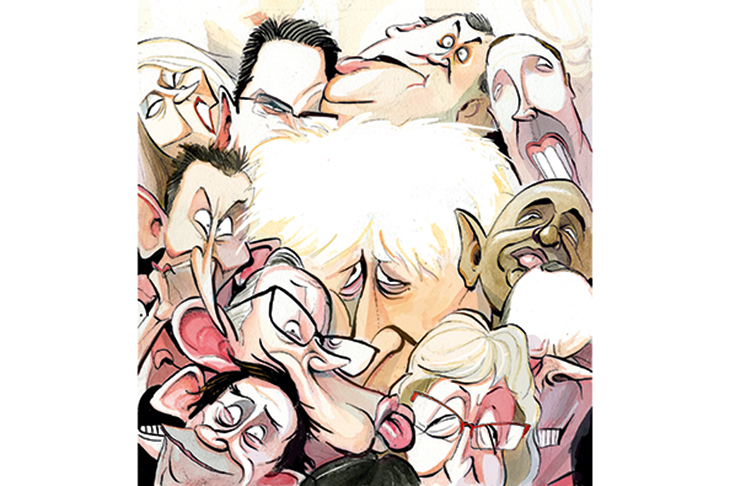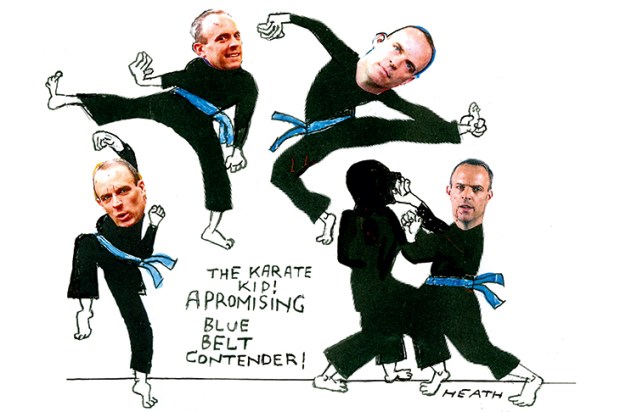Parties don’t get rid of their leaders unless things are going very badly. But this Tory crisis is different in scale and size to anything we have seen in recent decades. The question is not whether the Tories can win the next election, but whether they can survive.
The dire state that the Tories are in hasn’t put anyone off running to be leader, however. We suddenly have the most crowded field we have ever seen in a leadership race.Whoever wins will become prime minister without having to go through a general election. It’s quite a prize. Given the unpredictability of Tory contests and the frontrunners’ ability to destroy each other, everyone thinks they have a chance.
The parliamentary rounds of this contest are best thought of as similar to Wimbledon. There are two sides of the draw, and each side will send one candidate into the final party members’ round, which will take place in July. On one side, there is the competition to be the full-blooded Brexiteer: Boris Johnson and Dominic Raab are the top seeds on this side of the draw with Andrea Leadsom, Esther McVey and Steve Baker the wild cards. On the other side are the cabinet members, those who did not resign in dismay and emphasise the need for compromise. They are Jeremy Hunt, Sajid Javid, Michael Gove, Matt Hancock and Rory Stewart.
Whoever comes out of the Brexit side of the draw will enter the members’ round as firm favourite, given the views of grassroots Tories. But it is currently the cabinet side of the contest that is the more interesting.
Jeremy Hunt was the favourite on this side, but his campaign has got off to a stumbling start. A few months ago, Hunt started to change his tone on Brexit in a way that would make him more competitive in the final members’ round of the contest. The analysis of his cabinet colleagues was that he had decided there was little point in making the final two if you had no chance of winning when you got there.
But Hunt’s new willingness to entertain the possibility of no deal angered those of his colleagues who are opposed to it. They started to see him as a flip-flopper, claiming that when an all-day cabinet discussed no deal he said one thing in the morning session and another in the afternoon. (A charge that Hunt’s allies vigorously deny.) But Hunt is now tacking back towards their position, warning that a new prime minister going for no deal would be ‘political suicide’. Those who have spoken to him, though, have been told that he is not taking the no-deal option off the table. This confusion is creating the impression that the Hunt campaign is in a panic: that he is being buffeted by events.
Hunt is now being pulled in two different ways on his side of the draw. Matt Hancock, the Health Secretary, and Rory Stewart, the International Development Secretary, are both tapping into the irritation among former Remainers at Hunt’s behaviour. One minister of state who I would have expected to be a natural Hunt supporter told me that he now intends to vote according to his conscience in the opening round of the contest. If Hunt, as Foreign Secretary, underwhelms in the first round then more of his support will ebb away as MPs conclude that he won’t make the final two. Compounding this, Hancock and Stewart are both more natural campaigners than the Foreign Secretary. Stewart has spent the past week travelling round the UK, filming himself talking to voters.
Even more worrying for the Foreign Secretary is Michael Gove, who is — with considerable success — making the argument that only someone who campaigned for Leave in the referendum has a chance in the final round. So if you want a candidate who can win and stop those keenest on no deal, then it’s goodbye Jeremy Hunt.
Gove’s heterodox approach to policy means that he has reach in surprising parts of the party. The momentum behind his leadership bid may make him the cabinet finalist. This is particularly true as Sajid Javid, the Home Secretary, seems oddly unable to tell his own story. His father arrived in Britain with a pound in his pocket, Javid himself grew up on the ‘most dangerous street in Britain’ but from there he made it to the City and a career that was so successful he could enter politics aged 40. But you wouldn’t have learned any of this from his launch video, a staid affair shot in his parliamentary office.
The other side of the draw is a straight fight between Boris Johnson and Dominic Raab. The consensus in parliament is the former London Mayor is currently ahead of the former Brexit Secretary with the MPs. But Boris Johnson needs a decent cushion of support in the first ballot given that Raab is more likely to pick up support as the harder Brexiteer candidates are eliminated. Set against that is the fact that Johnson has more reach in the rest of the party than Raab appears to. Some of those who until recently were fretting about a Johnson leadership (and that he might be unstoppable if he gets as far as the Tory membership) have now decided that he is less of a worry than Raab.
A Boris Johnson vs Michael Gove rematch is, at present, the most likely outcome. But it has been a long time since a Tory leadership contest ended in what was initially the most likely outcome. Given the history between the two (Gove was going to run Johnson’s campaign in 2016 only to withdraw his support on the morning of its launch and run himself) this would be quite a turn of events.
Some cabinet ministers fear that it would become just another episode in the Tory psycho-drama and infuriate a public weary of the Tories’ theatrical behaviour. But a debate between the se two could do several things that the Tories need. It would allow a proper debate about what Brexit is for, revive the Tories’ moribund domestic agenda and offer some hope of finding a centre-right prospectus that could appeal in both Battersea and Bishop Auckland. Neither Gove nor Johnson belong fully to any one Tory faction, which makes them both more open to new ideas and innovative in their thinking.
The Tory party is attempting to answer four different questions in this contest. The first is who can best get Britain out of the EU. This will require not just an ability to find a way to extract concessions from a recalcitrant EU, but also an understanding of how to get Britain’s departure through parliament. Secondly, the Tories are trying to work out who is best placed to take on Jeremy Corbyn and Nigel Farage. Given the parliamentary numbers, the next election is likely to come sooner than 2022 and so the Tories need someone who can fight on two fronts simultaneously. The next question is who can come up with a new domestic agenda. The failure of Theresa May’s attempt to reinvent the Tories as a Christian Democrat party has resulted in a vacuum where Tory domestic policy should be. Finally, the Tories must ask themselves who could best do the job of being prime minister.
The problem for the party is no one candidate is the best answer to all four questions. The Tories will have to make trade-offs to decide which qualities they regard as the most important. The good news, however, is that the leading candidates for the job are all better suited to the current requirements than May was; they are all more able to explain and persuade than she is.
Nevertheless, the lack of a perfect candidate makes it vital that whoever succeeds May genuinely tries to build a government of all the Tory talents. No one person can get the Tory party out of the hole it is currently in, but a team of people might just be able to. I suspect that the candidates who understand this will gain ground with MPs in the coming weeks. And if they fail? The Tories don’t need to imagine the outcome, having just been visited by the ghost of elections future. In the European Parliament elections, a Tory party that had failed to deliver Brexit came fifth, received less than 10 per cent of the vote and didn’t win a single local authority. If this were repeated in a general election, the most successful political party in western history would be finished.
But getting Britain out of the EU is a necessary but not on its own a sufficient condition for any Tory recovery. Winning a fourth term in office will also require a domestic agenda that addresses the point that capitalism will never be supported by those without capital, or any hope of acquiring it.
Few leadership contests have been more important in the history of the Tory party than this one. The winner will either be remembered as the prime minister who took Britain out of the EU or the last Tory prime minister.
Got something to add? Join the discussion and comment below.
Get 10 issues for just $10
Subscribe to The Spectator Australia today for the next 10 magazine issues, plus full online access, for just $10.
You might disagree with half of it, but you’ll enjoy reading all of it. Try your first month for free, then just $2 a week for the remainder of your first year.















Comments
Don't miss out
Join the conversation with other Spectator Australia readers. Subscribe to leave a comment.
SUBSCRIBEAlready a subscriber? Log in